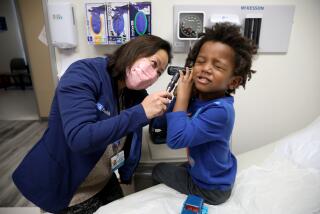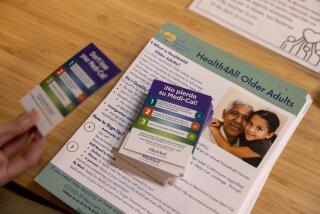Report Tracks Health Care for Elderly
- Share via
Most California senior citizens report that they are in good health, but elderly Latinos and others who speak limited English say they have more health complications and poorer access to care than their peers, according to a comprehensive state survey.
The report by the UCLA Center for Health Policy Research examines physical and mental ailments, insurance coverage and access to culturally appropriate services for the state’s 3.6 million people age 65 and over.
The report, “The Health of Older Californians,” was commissioned by the California Endowment, a health-care philanthropy, and partially funded by the Archstone Foundation. It draws on data from the 2001 California Health Interview Survey and the 2000 U.S. census.
Sweeping in scope, it gives information on the demographic variations among the state’s counties and touches on the prevalence of such conditions as diabetes, hypertension, arthritis and skin cancer. The findings are analyzed by ethnicity, economic status and gender.
Overall, most older Californians say their health is “good,” “very good” or “excellent,” with 30% reporting their health to be “poor” or “fair.” But senior citizens in all minority groups said their health was “poor or fair” more often than non-Latino whites.
Elderly people with incomes at less than 200% of the federal poverty level, those with limited English skills and people receiving Medi-Cal coverage also were more likely to say that their health was “fair” or “poor.”
Elderly Latinos and those speaking limited English -- groups that overlap -- said they received fewer preventive services, such as prostate screenings, and carried less insurance coverage.
Generally, people 65 and older are eligible for the federal government’s Medicare program, but additional coverage for treatment and drugs not covered by Medicare costs extra.
“There is a lot more that needs to be done in the area of prevention and health promotion to help elderly who have chronic illnesses stay as well as possible,” said Steven Wallace, lead researcher on the study.
For example, Wallace noted, one-third of respondents did not receive a flu immunization shot in the past year. The worst rates are in Imperial, Riverside and Napa counties -- 37% to 38% -- and among African Americans and Latinos.
“If you look at a number of clinical preventive services that could be increased, they are no-brainer things like flu shots,” Wallace said. “It’s a simple low-cost measure that means you’ll have fewer people getting sick, fewer people going to the doctor and fewer people dying.”
Officials at the California Endowment said they hoped county officials would use the data to increase health services to minority communities.
“We commissioned this report because we’re trying to determine the health of older Americans and particularly, of people of color,” said the endowment’s spokeswoman, Elinor Gilbert. “These are people who fall through the cracks.”
While general health improvements can be seen in the non-Latino white population, gains are fewer for elderly people of color -- with the exception of skin cancer rates.
For example, African Americans are far more likely to smoke than the elderly of other groups. Also, while smoking and heavy drinking are not commonly reported among older people in California, smoking rates differ widely among the state’s counties.
Shasta, Napa and Sacramento counties report the highest rates, more than 12%, while Fresno, Contra Costa, Santa Barbara and San Francisco counties report the lowest rates of smoking, at 5% or less. Nationally the rate among senior citizens is 9.7%.
Diabetes is most prevalent -- over 18% -- in counties with large numbers of minority elderly such as Fresno, San Joaquin, Imperial and Riverside counties.
Older Latinos and African Americans report twice the rate of diabetes as non-Latino whites.
About one-quarter of elderly African Americans reported having diabetes, as did elderly Latinos. By contrast, only 13% of non-Latino whites reported having it.
“That’s not necessarily a surprise, but if you’re looking at how all sorts of public health programs are about to collapse, it’s important,” Wallace said.
“Diabetes is a condition where if not properly managed medically, it leads to problems with your heart, amputation and blindness. In a year or two the damage is done.”
More to Read
Sign up for Essential California
The most important California stories and recommendations in your inbox every morning.
You may occasionally receive promotional content from the Los Angeles Times.













